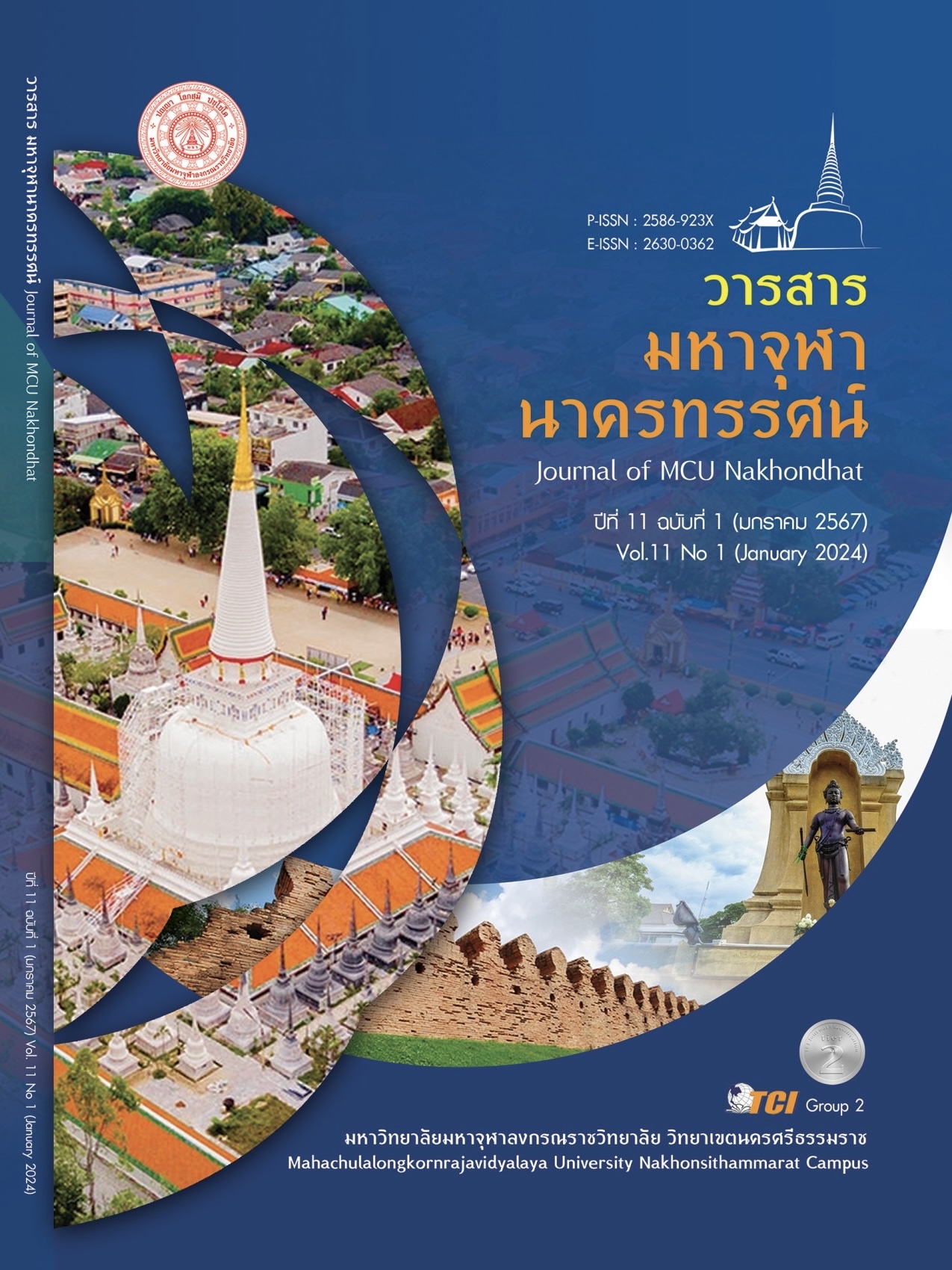APPLICATION OF THE PRINCIPLES OF IDDHIPADA FOR YOUNG PEOPLEIN DIGITAL EDUCATION
Main Article Content
Abstract
Thai education in the digital age is an education in which teachers and students must always accept changes. It is important for young people to fully master all the skills that children need in the future world. Young people are the foundation and future of the country; Develop the potential of the younger generation, whether in learning ability or in combination with morality; It is a system to cultivate the potential of young people; In order to make them become the driving force of society, the most important thing they see is the "education system". Therefore, the question arises: How can we make people live a happy life in the 21st century and improve their skills necessary for living in the digital era, so as to produce high-quality learning and make them physically and mentally healthy? Among them, in terms of social development, young people must master all aspects of knowledge, strengthen innovation, and realize the infinite peak of educational innovation. Any young people who may fall into development urgently need to invest in high-quality human resources of young people and young people to help promote the country to achieve its future economic and social goals. The specific way is to successfully develop education by applying the principle of Iddhipada, and further develop education in the digital world according to the principle of Iddhipada. Through effective learning, Students should follow the 4 principles of Iddhipada, which is a guideline for learning to work successfully that the Lord Buddha had carefully heard. It consists of 4 principles of practice, namely chanda, viriya, citta, and vimansa. All 4 of them continuously support each other. No one of them can be lacking in order to make us successful in life and work according to our hopes and goals. important “The 4 Iddhipāda principles” do not arise in isolation from other dharma principles, which are holistic and interconnected. Buddhist principles are a framework for organizing learning and driving learning for students to learn according to Buddhism. How to use it to solve problems and improve the lives of students.
Article Details

This work is licensed under a Creative Commons Attribution-NonCommercial-NoDerivatives 4.0 International License.
References
ธัญภา แสงตันชัย. (2561). การบริหารสื่อและเทคโนโลยีการจัดการเรียนรู้ของโรงเรียนมัธยมศึกษาเอกชน ในกรุงเทพมหานคร. กรุงเทพมหานคร: มหาวิทยาลัยธุรกิจบัณฑิตย์.
พระครูสังฆรักษ์พิทยา ญาณธโร (ปิยวรากุล). (2561). ศึกษาการเผยแผ่พระพุทธศาสนาในประเทศไทยยุคดิจิทัล. ใน วิทยานิพนธ์พุทธศาสตรมหาบัณฑิต สาขาวิชาพระพุทธศาสนา. มหาวิทยาลัยมหาจุฬาลงกรณราชวิทยาลัย.
พระพรหมคุณาภรณ์ (ป.อ.ปยุตโต). (2549). พุทธธรรม ฉบับปรับปรุง และขยายความ. (พิมพ์ครั้งที่ 11). กรุงเทพมหานคร: โรงพิมพ์บริษัท สหธรรมิก จำกัด.
พระพรหมคุณาภรณ์ (ป.อ.ปยุตโต). (2552). การศึกษาทั่วไปเพื่อพัฒนามนุษย์. กรุงเทพมหานคร: มหาวิทยาลัยศรีนครินทรวิโรฒ.
พุทธทาสภิกขุ. (2537). การทำงานที่เป็นสุข. กรุงเทพมหานคร: ธรรมสภา.
ไพโรจน์ ชินศิรประภา. (2550). สนุก สุขใจ ได้ปัญญา. กรุงเทพมหานคร: มูลนิธิไทยคม.
มหาจุฬาลงกรณราชวิทยาลัย. (2539). พระไตรปิฎกภาษาไทย ฉบับมหาจุฬาลงกรณราชวิทยาลัย. กรุงเทพมหานคร: โรงพิมพ์มหาจุฬาลงกรณราชวิทยาลัย.
ราชบัณฑิตยสถาน. (2546). พจนานุกรมศัพท์ศาสนาสากล. กรุงเทพมหานคร: บริษัท นานมีบุ๊คส์พลับลิเคชั่นส์ จำกัด.
วิทย์ วิศทเวทย์ และเสฐียรพงษ์ วรรณปก. (2544). หนังสือเรียนวิชาพระพุทธศาสนา ชั้นมัธยมศึกษาปีที่ 5. กรุงเทพมหานคร: อักษรเจริญทัศน์.
สัญญา สัญญาวิวัฒน์. (2550). การบริหารจัดการแนวพุทธ. กรุงเทพมหานคร: ศูนย์หนังสือแห่งจุฬาลงกรณ์มหาวิทยาลัย.
อติพร เกิดเรือง. (2560). การส่งเสริมการเรียนรู้ในศตวรรษที่ 21 เพื่อรองรับสังคมไทยในยุคดิจิทัล. วารสารวิชาการ มหาวิทยาลัยราชภัฏลำปาง, 6(1), 173-184.
Hogan M.J. (2005). Adolescents and media violence: Six crucial issues for practitioners. New York: Med Clin.


